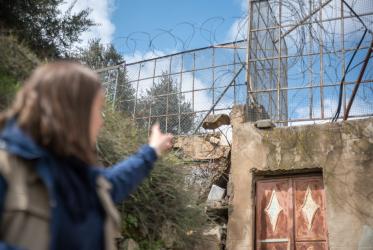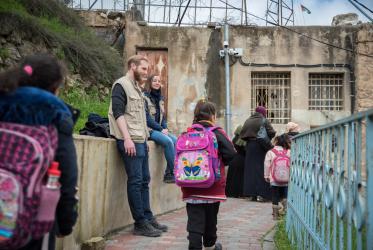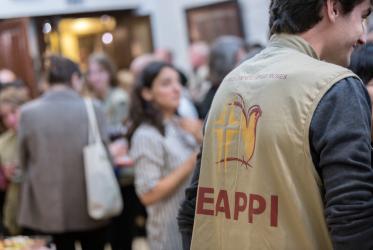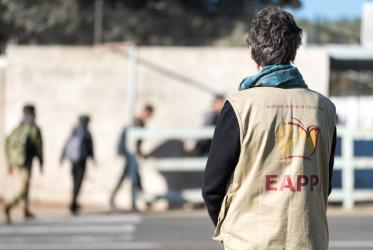Ecumenical Accompaniers (EAs) walk children to school, accompany shepherds, serve as a presence of peace, and share what they see. They are the fruit of the World Council of Churches Ecumenical Accompaniment Programme in Palestine in Israel (WCC-EAPPI).
Below are reflections from a variety of EAs who are in diverse settings. They offer very personal perspectives on life around them.
What farmers are facing
One EA describes what one couple, who are farmers, face in order to take care of their land.
Suhaila and Naim, an elderly couple, live 100 metres from their farmland but, because of the Israeli occupation of Palestine, they must travel 20 kilometres to get there.
Rather than simply walk to the end of their road, Suhaila and Naim travel around 20 kilometres and pass through an Israeli military checkpoint to reach their land. They make this journey every day to care for their trees and beehives. On a good day, driving this route takes around half an hour. If soldiers delay them with extra questioning and checks, the journey takes up to two hours.
“We are doomed to eternal suffering by the separation wall,” says Suhaila. “The most important aspect for me is losing my best recreation activity”. Before the construction of the separation barrier, she went to their land several times a day whenever she felt upset to make her feel better. Being blocked from her land, she says, is deeply painful.
Suhaila asks that we “do not make both eyes blind to political affairs and sleep on our suffering in Palestine”.
Azzun: the village of the imprisoned children
An EA describes one family’s challenges in the village of Azzun.
Salaam is a mother of seven; she has five boys and two girls. So far, three of her five boys have been arrested by Israeli Security Forces. There is Ala, the eldest one. He was 17 years old when he was arrested and sentenced to seven years in prison for throwing stones. He is now 26, happily married and with a lovely baby son. There is Amir, a 21-year-old shy young man who has problems keeping eye contact. The family says he has special needs; sometimes he stares at things for a while. He did the same the day he got arrested. He was a street cleaner at the time and whilst working he stared up at a military watchtower where Israeli soldiers were sitting. His family said the soldiers probably thought he was up to something, so they arrested him. He was charged for throwing stones and was in prison for one year. He was released a month ago and the whole town celebrated his release. We were happy to share that special moment with the family. Only two days later, Salaam’s youngest son – Ahmed – was arrested in the middle of the night. Ahmed is only 15 years old. Heavily armed soldiers broke into the house and arrested him out of his bedroom. This is the third time Ahmed has been arrested. Now the family is grieving again. Ahmed was charged with throwing stones, a very common charge for Palestinian children. The soldiers say they have evidence of the event, but neither the family nor the lawyer of Ahmed has access to that evidence. Ahmed told his family he didn’t do it.
Salaam and her family are not an exception. This is the reality for the people of Azzun, a town with approximately 4,000 inhabitants and the highest number of child prisoners in Palestine after East Jerusalem. Since the beginning of 2018, 27 children from Azzun have been arrested. Many non-governmental organizations accuse Israel of not acting in accordance with the International Convention on the Rights of the Child.
Sheep, Soldiers and Settlers
EAs also provide a protective presence for individuals or groups whose human rights are threatened. This can mean accompanying shepherds who are scared to take their herds to certain lands because of fear of violence. Sometimes EAs can prevent possible human rights violations with their presence.
One EA describes accompanying a shepherd, arriving to be with his family before dusk.
The summer sun eases its relentless midday scorch and the temperature becomes bearable for human and animal life. About half a year ago, the shepherd we meet was attacked by a gang of settlers who mauled him, killed five of his sheep and stole 30 of them. Their message was simple: do not come too close to the settlement. The shepherd has since changed the area where he takes his animals in fear of another attack. The perpetrators have not been caught and he has not received any compensation for his losses. Due to risk of violence, he welcomed us to accompany him for the night.
As we walk, a white van on the road overlooking the hill appears and stops. The shepherd tells us that the same van comes every night and the driver follows him with his binoculars. He finds it unsettling and disturbing. We continue to climb up and down the hill, stopping occasionally to let the sheep and goats graze on the dry weeds that grow out of the rocky earth. As the sun sets, we return to the shepherd’s house. He thanks us, and tells that he felt safer with us accompanying him and, because of our presence, he was able to take his herd further than usual.
“Yes, it’s a bed”
Another EA also describes accompanying a shepherd.
We are based in South Hebron Hills and much of our time is devoted to protective presence work with shepherds, and this includes sleepovers.
We had agreed to do a sleepover for a shepherd, whose dwelling is quite close to a settlement and some distance from the village, so he and his family are quite isolated. There had recently been increased harassment, and they were anxious about their safety.
As night fell the shepherd asked us: “Do you have problems with dew?” We were led outside and shown a large trailer filled with bedding. I realised then what he meant by “dew”. We climbed up on to the trailer feeling much indulged at having so much space to ourselves.
After 20 minutes, the two children (aged 3 and 4 years) were hoisted up. Then Mum climbed up to join us – making five in the bed. “Okay,” I thought.
Bedding was thrown down for the husband, and he bedded down for the night on a large flat rock nearby.
We were finally able to settle and as I lay on my back looking up at the starry night, Mum swept her arm skywards and said “beautiful”. And despite all the turmoil and difficulties that mark Occupied Palestine, I had to agree (and there were no unwanted intrusions that night).
Early morning business: EAs accompany Bedouin shepherds in Jordan Valley (WCC feature of 7 October 2018)
EAs offer protective presence, night as well as day, as Khan al Ahmar faces demolition threat (WCC feature of 4 October 2018)
Ecumenical accompaniers share observations with EU (WCC press release of 11 February 2018)
Learn more about the WCC-EAPPI
The WCC-EAPPI was created in 2002 by the WCC based on a letter and an appeal from local church leaders to create an international presence in the country.
EAPPI provides a continuous presence of 25-30 Ecumenical Accompaniers, who serve in the field for three months in accompanying local people and communities, offering protective presence, and witnessing their daily struggles and hopes. EAPPI is guided by “principled impartiality”: it takes no side in the conflict nor discriminates against anyone, but it is not neutral in terms of human rights and respect for international humanitarian law.







